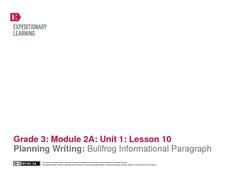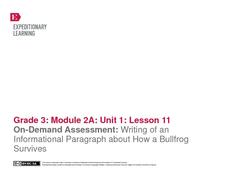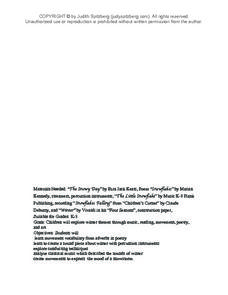Curated OER
Celebrating Groundhog Day with your Students
Celebrating Groundhog Day in your classroom is a fun-filled way to explore science, art, and literature.
EngageNY
Science Talk: How do Bullfrogs Survive
Following the reading of the book Bullfrog at Magnolia Circle, the ninth lesson in this unit involves emerging experts in a science talk about how bullfrogs survive. Looking back through the text, young scholars prepare for the...
EngageNY
Planning Writing: Bullfrog Information Paragraph
Lesson ten in this unit for the book Bullfrogs at Magnolia Circle, prepares third graders to begin writing an informational paragraph about the adaptations of bullfrogs. First, young writers work either independently or in pairs to...
EngageNY
Mid-Unit Assessment: Close Reading of Bullfrog at Magnolia Circle: Bullfrog Life Cycle
The sixth lesson plan in this Bullfrog at Magnolia Circle unit assesses your third graders' ability to read and understand informational text. The included assessment asks learners to take notes about the main idea and supporting details...
EngageNY
Close Reading of Bullfrog at Magnolia Circle: Main Ideas about the Bullfrog
As your class reaches the end of the book Bullfrog at Magnolia Circle, the seventh lesson in this literary unit helps third graders transition from reading narrative to expository writing. Scholars develop their note-taking skills as...
EngageNY
On-Demand Assessment: Writing of an Information Paragraph About How a Bullfrog Survives
Having read and discussed Bullfrog at Magnolia Circle, third graders demonstrate their bullfrog expertise by writing informational paragraphs. Building on the note-taking and paragraph planning from the previous lesson plan, learners...
Field Museum
The Case of Darwin's Finches
One of the most striking pieces of evidence for Darwin's Evolution of Species was his observations of finches and how their beaks differed from island to island, depending on their primary food sources. So what would happen to the theory...
US National Library of Medicine
Frankenstein: Penetrating the Secrets of Nature
Just because you can, should you? Reflections on the ethics and limits of medical research are prompted by a reading of excerpts of Mary Shelley’s Frankenstein, viewing of clips from the 1931 film, and examining sections of the online...
National Endowment for the Humanities
Galileo: Revealing the Universe
To gain an understanding of the significance of Galileo Galilei's revolutionary ideas, class members watch the short video "Stargazing Before Galileo," and conduct a close reading of Galileo's Sidereal Messsenger. They then compare...
Core Knowledge Foundation
Seasons and Weather: Supplemental Guide
From warm summer days to cold winter nights, this 10-lesson unit takes children on an exploration of seasons. Using the included reading passages and images, a series of read-aloud lessons and vocabulary activities provide young children...
Normal Community High School
Golf Ball Lab
The first golf balls were made of wood and would only last for a few games. Modern golf balls last a lot longer but they don't float. The presentation provides the directions for a lab to determine the minimum amount of salt needed to...
Curated OER
A Garden of Verses: Poems About Class Gardens
Students explore botany by participating in a language arts activity. In this garden poetry lesson, students read the classic poem "Mary, Mary Quite Contrary" and discuss the imagery and rhyming methods used. Students examine their own...
Curated OER
Tuberculosis Project
Reasearch the transmission of tuberculosis and design a communication product to help youth understand the risks of the disease, how it is tested for, and the benefits of proper treatment. This project incorporates language arts, math,...
Curated OER
Centripetal Force
In order to investigate cetntripetal force and angular momentum, youngsters compare the motion of erasers hung from a string. It is not clear what type of Amish toy is needed in the warm up activity, so you may not be able to use it. The...
San Francisco Public Utilities Commission
Hetch Hetchy: The Story of San Francisco's Water
How did San Francisco supply enough water for its residents over the last two centuries? Learn about droughts and water conservation in California, as well as specific historical events that led to the water system today. Kids read two...
Curated OER
Habitat Art: Florida Panthers
Young scholars discover the lifestyles of a Florida Panther by investigating its habitat. In this wild animal activity, students utilize the Internet to research the habits of a Panther and what their habitat is. Young scholars create...
Curated OER
Winter Through the Arts
Students read the book The Snowy Day and discover various winter themes. In this winter lesson, students develop movements to express the feeling of a snowstorm. Students also construct winter-themed art pieces.
Curated OER
Body Language
First graders investigate the three main parts of a plant. In this plant parts lesson, 1st graders explore vocabulary for the topic and read a story about plant parts. Students view a PowerPoint and take a quiz for the topic. Students...
University of Minnesota
Beautiful Brain: Brain Inspiration
"Neuroscientists consider Cajal as important to their discipline as Einstein is to physics." The first of four lessons has scholars view Santiago Ramon y Cajal's drawings of neurons. They reflect and respond to the art through writing...
K12 Reader
Where On Earth Are You?
What do we use to determine the exact locations on the earth? Your kids can learn all about compass roses and latitude and longitude. Test understanding with the five reading comprehension questions included on the page.
PreKinders
The Animals of the Umbrella
If you're reading Jan Brett's The Umbrella, a presentation featuring the animals from the story is an excellent way to augment your lesson. Featuring gorgeous photographs of rainforest animals, as well as Spanish phrases and English...
Seussville
The Lorax's Earth Day
Add a touch of Dr. Seuss whimsy to your Earth Day celebration with six pages consisting of Earth-friendly, inspiring, and engaging activities designed to enhance the beauty of your school campus and showcase the famous story, The Lorax.
Alliance Theater
The Jungle Book Post-Show STEAM Lesson
An ecosystem is really just the flow of energy through many different living organisms. A study of Rudyard Kipling's The Jungle Book leads to an environmental science activity in which learners study how various factors can affect...
Curated OER
Watercolor Leaves
Create your own fall landscape in kindergarten! After listening to a story about fall and discussing why leaves change colors, young learners use the crayon resist technique and color resist art technique to craft their own illustrations.
Other popular searches
- 5th Grade Language Arts
- 3rd Grade Language Arts
- 4th Grade Language Arts
- Second Grade Language Arts
- English Language Arts
- 1st Grade Language Arts
- Kindergarten Language Arts
- Language Arts Jeopardy Game
- First Grade Language Arts
- Language Arts School Projects
- Language Arts Lesson Plans
- Language Arts Games

























